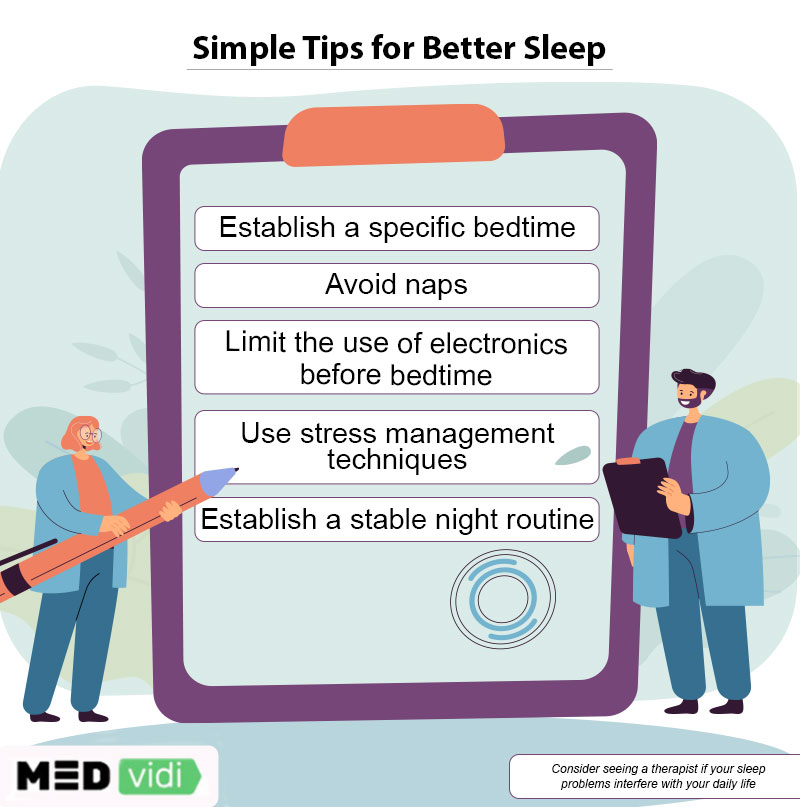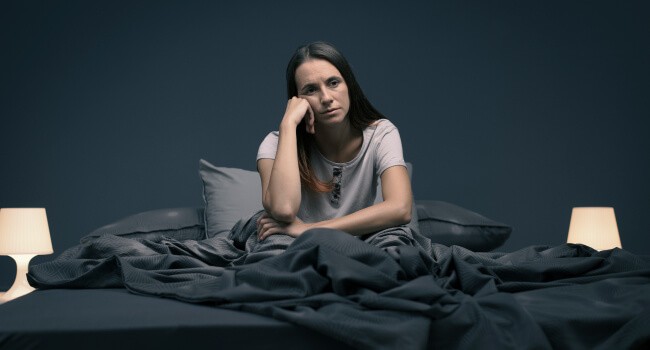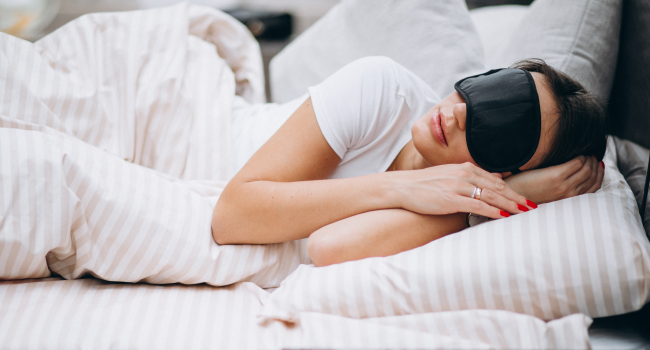Good sleep refreshes, repairs, and reinvigorates your body and mind. It also helps reduce your risk of
But for many people, getting restful sleep is easier said than done. That’s where good sleep hygiene comes in: it helps to train your body to rest properly so you can get the benefits of good sleep each night.
Highlights
- Good sleep hygiene can help improve both sleep quality and quantity.
- Your habits, sleep space, and bedtime routines influence how well you sleep.
- Sleep hygiene practices alone may not help if you have serious problems with your sleep. Reach out to a medical provider if you think you need professional support.
What Is Sleep Hygiene?
Sleep hygiene refers to all the things you can do to improve your chances of sleeping well each night. It includes your habits, routine, and sleep space during bedtime and beyond. It is not enough to have the “perfect” sleep schedule. Your environment also has to be just right.
Let’s take a look at some of the behavioral and environmental factors that affect sleep.
Behavioral factors:
- A good sleep schedule, which means you go to bed at around the same time every night.
- A healthy bedtime routine, such as avoiding your phone or bright screens for a while before you sleep, reading a book, or meditating.
Regular exercise[2] can help improve sleep by increasing your natural levels of hormones that support sleep — like melatonin.- Avoiding nicotine, caffeine, or other stimulants. Avoiding drinking lots of fluids close to bedtime.
- Lying still with eyes closed, and all distractions put away.
Environmental factors:
- Your room’s temperature. The ideal temperature for sleep is between 60-67 °F (15.5-19.5 °C) for most people.
- Keep your room as dark as possible. Bright lights can affect sleep by
disrupting your circadian rhythm[3] . - A quiet room, laid out properly. Soft, soothing music, noises (white, brown, green), or a loved one’s voice.
- The right bed, pillows, and sheets. Some people have difficulty sleeping in bedding that isn’t “breathable.” Sheets should be clean and comfortable.
- Plenty of
fresh air[4] , free from smoke, dust, and strong smells.
The effect of these factors may differ from person to person; you may need to try them out to determine what works for you.

Why Is Sleep Hygiene So Important?
Simply put, sleep hygiene is important because it increases your chances of sleeping well. It also helps eliminate some of the common causes of sleeplessness and allows you to reap many benefits, including:
What Is Poor Sleep Hygiene?
Poor sleep hygiene means taking actions and staying in environments that don’t support good sleep. It refers to behaviors and environmental conditions that make it difficult for you to maintain healthy and rejuvenating sleep.
Both your behavior and your environment are important. If you have the right habits but your environment makes it hard for you to fall asleep and stay asleep, then your sleep hygiene is still poor.
Some Common Signs of Poor Sleep Hygiene
Different signs can indicate bad sleep hygiene. Here are some things to look out for:
- Trouble Falling Asleep: Irregular bedtimes and staying awake past your usual hours can make it hard to fall asleep. An uncomfortable environment, such as a noisy, bright, hot, or stuffy room, can also contribute.
- Frequent Night Waking: This could mean something keeps interrupting your sleep. It may be noise, lights, a full bladder, or stimulants.
- Daytime Sleepiness or Fatigue: This may be a sign that you are not getting enough sleep at night.
- Feeling Cranky: Feeling out of sorts, mood swings, irritability, and an inability to focus are all linked with poor sleep.
Common Mistakes That Result in Poor Sleep Hygiene
Fortunately, there are a lot of ways to improve your sleep. Here are some common pitfalls to avoid if you find yourself waking up tired every morning:
- An Irregular Sleep Schedule: Your body regulates sleep using the circadian rhythm and something called the
sleep homeostatic drive[8] . An irregular sleep cycle disrupts the homeostatic drive, making it harder for you to sleep well. - Too Much Screen Time Before Bed: Your body needs melatonin to regulate your sleep, and research shows that blue light from screens
suppresses melatonin production[9] . - Drinking Caffeine or Alcohol Late: Energy drinks, caffeine, and alcohol can
make it hard to fall asleep[10] by keeping you more active and alert. - Using the Bed for Non-rest Activities: Working, studying, or engaging in other activities in bed besides sleep or intimacy can weaken your brain’s link between the bed and relaxation.
- Heavy Meals at Night: Large or late-night meals can make it hard for you to fall asleep. Eating less than an hour before bedtime also increases your chances of
not sleeping through the night[11] . - Sleeping With Lights On: Dark, cool rooms support sleep and restfulness. Sleeping under bright lights has been linked with a
higher risk of chronic conditions[12] like high blood pressure, obesity, and heart disease.
Principles of Good Sleep Hygiene
Good sleep hygiene rests on four pillars that include:
- A Consistent Sleep Schedule: Your body aims to regulate your sleep by observing when you are awake and when you are not. It’s recommended to create a sleep schedule that suits your personal and professional activities and stick to it.
- A Relaxing Bedtime Routine: A sleep routine that prepares you for bedtime tells your body and mind it is time to sleep. A predictable set of actions in the same order every night helps you wind down before sleep. It can be a warm bath, gentle stretches, reading a book, meditating, or any other soothing activity.
- A Healthy Sleep Environment: Your environment can go a long way to improving your sleep. Keep your bedroom dark, cool, and quiet. Consider using a sleep mask or blackout curtains if necessary. If you need a night light, keep it dim and favor orange or amber lighting while avoiding white or blue lights.
- Smart Daytime Habits: What you do in the day can impact the quality of sleep you get at night. Avoid excessive napping, caffeine, and sleeping wherever you find yourself (desk, couch, in front of the TV). Getting enough exercise and early sunlight can also help you sleep better.


Practical Sleep Hygiene Tips for Better Rest
These practices can help you improve your sleep hygiene and get healthier, proper sleep.
Optimize Your Sleep Schedule
- Try to go to sleep at a set time each night. Choose a bedtime that allows you to get 7–9 hours of rest before you need to wake up and fits comfortably with your personal and professional routine.
- Don’t take too many naps during the day. If you feel sleepy during the day, a small nap of 20-30 minutes before 3 p.m. should help. Any longer or later than that, and you could disrupt your sleep rhythm.
Create a Relaxing Bedtime Routine
- Try wind-down activities. Do something you love that calms you and makes it easier for you to fall asleep. For some people, light reading does the job. But for others, a warm bath, stretching, changing into nightwear or pyjamas, brushing teeth, meditating, or praying might be ideal.
- Avoid bright screens before sleep. Don’t use your phone if you don’t have to. Don’t use the computer or be too close to the TV, too.
- Follow the same routine every night; this tells your brain it’s sleep time.
Design a Healthy Sleep Environment
- Keep the temperature of your room between 60-67 °F (15.5-19.5 °C), with just the right humidity. Air conditioning or fans may help on hot nights.
- Use a comfortable mattress, pillows that don’t cause any aches, and breathable bedding.
- Use your bed only for sleep and intimacy, so that your mind associates your bed with sleep and rest.
- Keep the room dark and quiet. Use earplugs if there is unwanted noise you can’t turn off.
- Create boundaries that help you sleep. If you have kids, encourage quiet activities in the evenings to keep the environment calm. A steady bedtime routine for everyone helps signal that it’s time to wind down.
Maintain Healthy Daytime Habits
- Exercise regularly. However, avoid vigorous exercise right before bed.
- Limit caffeine intake to mornings. Avoid nicotine and/or energy drinks a few hours before bedtime.
- Get some early sunlight when you wake up.
Manage Stress and Mindset
Since mental stress can make it harder to sleep, try these techniques:
- Keep a journal to track your worries or intrusive thoughts, so you can release them from your mind.
- Practice deep breathing and other relaxation techniques.
- Address worries before bedtime. For example, you might want to resolve any misunderstanding between you and your partner before going to bed.
Additional Tips
- Having sex before bedtime can support good sleep.
- Happy thoughts about being in your dream place with your loved ones, doing your favorite things, also help.
- Speaking to loved ones before you sleep can be soothing; you can also listen to a recording of their voice.
- A small cup of warm milk, chamomile tea, or tart cherry juice may help.
- Melatonin taken as a supplement can support good sleep.
- Aromatherapy with lavender oil can be soothing.
- A light massage can help you relax.
Adapting Sleep Hygiene to Individual Needs
You may have a schedule that means sleeping during the day, or a demanding job that threatens to keep you up all night. Here are ways to adapt sleep hygiene to your needs.
Sleep Hygiene Tips for Shift Workers
If you are a shift worker, here are a few tips for better sleep:
- Make sleep a priority after your shift.
- Limit caffeine to the early part of your shift.
- Keep the lights bright at work.
- Limit shift changes so your body gets used to a rhythm.
- If you have to sleep during the day, get eye pads, sleep masks, or blackout curtains.
- Take strategic naps where possible.
Sleep Hygiene Tips for Teenagers and Young Adults
Teenagers and young adults can see improved sleep when they:
- Avoid phones and social media during the hours leading up to bedtime.
- Avoid keeping irregular or very late sleeping hours.
- Don’t binge-watch shows or play games through the night.
- Don’t party past bedtime.
Sleep Hygiene Tips for Older Adults
As an older adult, you may experience fragmented sleep, where you wake up many times during the night. In this case, it may help to avoid napping, create a bedtime routine, and consult a doctor if sleep problems persist. You may also find that your medications affect your sleep. If this happens, discuss it with your provider so they can consider switching your medication or changing the timing.
When to Seek Professional Help
Good sleep habits alone may not be enough to solve every sleep problem, and you may need professional help. Some warning signs that show you need to see a doctor include insomnia, sleep apnea, anxiety, depression, and fatigue or excessive daytime sleepiness. If any of these symptoms are persistent, and poor sleep interferes with the quality of your life, you can see a healthcare provider at MEDvidi for personalized advice and online insomnia treatment.
Sleep Hygiene FAQs
What is considered a poor sleep environment?
A poor sleep environment is anything around you that makes it hard for you to fall asleep and stay asleep. This could include loud noises, bright lights, uncomfortable bedding, a room that is too hot or too cold, pets or pests (mosquitoes, bedbugs, cockroaches), poor air quality, and not having a dedicated sleep space.
What are the consequences of poor sleep hygiene?
Poor sleep hygiene can lead to poor sleep quality and quantity and may have immediate and long-term effects. Immediate consequences include mood disturbances, problems with concentration, higher risk of accidents, poor productivity, and heightened stress. Long-term consequences include an increased risk of diabetes, heart disease, and undesired weight gain.
What are the three S’s of good sleep hygiene?
The three S’s of good sleep hygiene can be summarized as Sleep, Sex, Sickness. This means keep your bed for those three activities only. By doing this, you train your brain to associate your bed with rest, fun, and repair.
What does clean sleeping mean?
Clean sleeping means the same thing as “good sleep hygiene.” It encompasses the right environment and all the good habits you embrace to sleep well.
What is inadequate sleep hygiene?
Inadequate sleep hygiene is the same as poor sleep hygiene. It occurs when some habits or factors are stopping you from getting good sleep. It could also imply doing the right things, but inconsistently.
Practicing good sleep hygiene can increase your chances of good restorative sleep. Your habits and your environment matter when you need to sleep well. A few changes each day can help you create a great routine and supportive sleep space, allowing you to reap benefits in physical and mental health throughout your life.











